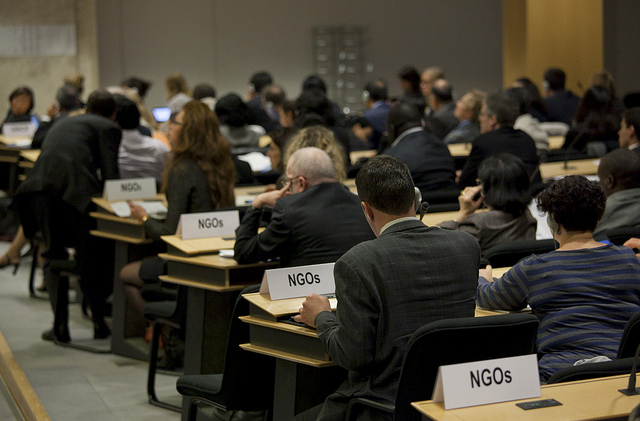During the first 2018 session of the NGO Committee, human rights NGOs continued to face obstacles in their attempts to get UN accreditation. This was particularly true in the case of applications deferred by the Committee several times over. Only 7% of deferred applications from human rights organisations were recommended for accreditation, compared to 23% of development NGOs.
Amongst those deferred again were NGOs working to challenge caste-based discrimination. The International Dalit Solidarity Network (IDSN) received its 83rd question from Committee member India. Any hope the Committee might consider 10 years of questioning to be sufficient, proved misplaced.
‘For 10 years the UN has kept the door closed to an NGO working with and for some of the most excluded communities,’ said ISHR’s Eleanor Openshaw. ‘The Agenda 2030 rallying cry of ‘no-one left behind’ is sounding very hollow in this case.’
Denmark – the country where the NGO is based – failed yet again to make a statement to support the application. The EU also kept quiet on the case.
‘Political and economic interests are taking precedence over responsibilities to enable the work of civil society,’ said Openshaw.
Votes called on two applications
The US called for votes on the applications of two human rights NGOs: Committee on Human Rights in North Korea, and Iran Human Rights Documentation Centre. Calling for a vote is a tactic employed to accelerate the process of accreditation after several deferrals. In both cases the NGO Committee voted against recommending accreditation (see full voting records below).
The US confirmed that it intended to have the cases reconsidered at ECOSOC, the parent body of the NGO Committee, in April. In response, Iran noted that if the Iran Human Rights Documentation Centre were granted accreditation by ECOSOC, there would be ways ‘to ensure their accreditation got withdrawn.’
‘This suggestion by Iran that they would work to secure the withdrawal of any accreditation granted, was one example of the threats and accusations made against NGOs seeking accreditation this session,’ said Openshaw.
The suggestion of terrorist affiliations
In recent sessions there have been several cases of accusations made against applicant NGOs of alleged associations or sympathies with terrorist groups or individuals connected to them. Such a suggestion can be used as a fast track to closing applications or forcing withdrawal of accreditation. This was the case with several cases in 2017, including in regard to NGOs working or until recently working in Turkey.
In one case this session, the US indicated that an organisation was on a list the US holds on NGOs suspected of links with terrorism. They then added that the basis of the concern was classified information. Russia challenged this approach.
‘Alluding to an NGO’s supposed terrorist connections without clear evidence or without providing the NGO with an opportunity to defend itself, at a minimum, is dangerous,’ said Openshaw. ‘All too often threats and accusations go unchallenged by other Committee members.’
The Committee workload
Committee workload and practice was one key focus on the session, with the Committee dedicating time – for the first time in open session – to discussing its working methods. Russia indicated its support to the Secretariat asking for more resources to help in processing applications.
Solutions need to be found to dealing with the workload, but these cannot jeopardise applicants bids for accreditation.
‘Several suggestions were made that we need to keep our eye on,’ said Openshaw. ‘These included the idea that there should be a cap placed on the number of applicants; that long-deferred cases should be closed, or that NGOs that failed to respond to questions to their quadrennial reports might lose their accreditation.’
Meeting between NGO Committee and accredited NGOs
The NGO Committee denied the request by ISHR to deliver a statement on behalf of several NGOs. Several States made statements in support of the request.
Following a decision by ECOSOC last year, the Committee on NGOs will meet with accredited NGOs to discuss the ‘evolving’ relationship between the UN and NGOs. These meetings are a required part of the work of the Committee which – for twenty years – it has failed to carry out. Accredited NGOs have been sent an invitation, with the date for the meeting still to be confirmed.
‘It is essential that the Committee set up remote participation to enable NGOs beyond New York to participate in the exchange,’ said Openshaw. ‘The Committee refused to listen to a joint NGO general statement during its session, but will be required to engage with accredited NGOs before long.’
Contact: Eleanor Openshaw at [email protected]
Photo: Flicker
1/ Key dates:
Meeting between accredited NGOs – NGO Committee on the relationship between NGOs and the UN: between now and the next session of the NGO Committee in May (although most likely before ECOSOC in mid- April)
Meeting of ECOSOC Coordination and Management Meeting (CMM): 16-18 April. ECOSOC will consider the recommendations of the NGO Committee. In addition, elections will be held for the 19 seats of the NGO Committee for the 2019-2022 term.
Next session of the NGO Committee: 21 May – 31 May 2018 & 11 June (adoption of report).
2/ Vote records:
Vote on recommending accreditation to Committee on Human Rights in North Korea
9 members voted against (Burundi, China, Cuba, Iran, Nicaragua, Pakistan, Russia, South Africa, Venezuela), 5 in favour (Greece, Israel, Turkey, US, Uruguay), 2 abstained (India, Sudan) and 3 were absent (Azerbaijan, Guinea, Mauritania)
2/ Vote on recommending accreditation to Iran Human Rights Documentation Centre
9 votes against (Burundi, China, Cuba, Iran, Nicaragua, Pakistan, Russia, South Africa, Venezuela), 4 in favour (Greece, Israel, Uruguay, US), 2 abstentions (India, Sudan) and 4 were absent (Azerbaijan, Guinea, Mauritania, Turkey)




